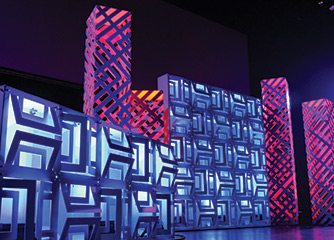Designing Concert Sets with 3D Printing
In the early 1990s, Tom McPhillips, a London-based theatre set designer known for creating innovative concert tour sets for performing artists founded ATOMIC. Today, ATOMIC consists of a world-class team of scenic artists, fabricators, and engineers who create immersive environments for the world’s top bands and largest brands.
Many of ATOMIC’s sets are built using modular panels that are conveniently packed tight but can be assembled into walls with complex three-dimensional aluminum or polycarbonate connectors. Developing these connectors require prototyping and assembly prior to a professional design for performance testing. Many operations are required to fabricate prototype connectors including sawing, bending, drilling and deburring of metal or plastic stock. In the past, it took a day to fabricate the simpler corner pieces and a week to fabricate more complex connectors. For instance, one section floats on a sphere connected to the other half, allowing two panels to be connected at any angle. This complicated piece required four weeks and cost $2,000 to make prototypes of two-foot long extruded aluminum connectors due to the outsourcing required.
Improving Design
“We looked at various 3D printing systems in an effort to streamline the prototyping process and get products to market faster,” said Charlie Cook, designer for ATOMIC. “We discovered that the parts produced by most were not strong enough to hold up to the rigors of assembling and testing sets.” According to Cook, FDM parts are so durable and rugged that they can be used as a final product when a few particular connectors are needed. Also, their uPrint 3D printer is small and quiet enough that it can be implemented in almost any office environment.
“FDM saves us time which helps us get new products to market faster” — Charlie Cook, Designer, ATOMIC
With their uPrint 3D printer, ATOMIC is able to take products to market faster while reducing their prototyping costs. What would normally take four hours to print is finished in about half the time with additive manufacturing. In addition, the printer works unattended so designers can set up the 3D printer and walk away while it builds the part. This saves time previously devoted to manual fabrication. More complex connectors with spheres can be printed in one day, an 80-percent reduction in the time previously required for conventional fabrication.
| Method | Time | Cost |
| Extruded Aluminum | 4 weeks | $2,000 |
| FDM | 1 day | $200 |
| Savings | 27 days (95%) | $1,800 (90%) |
